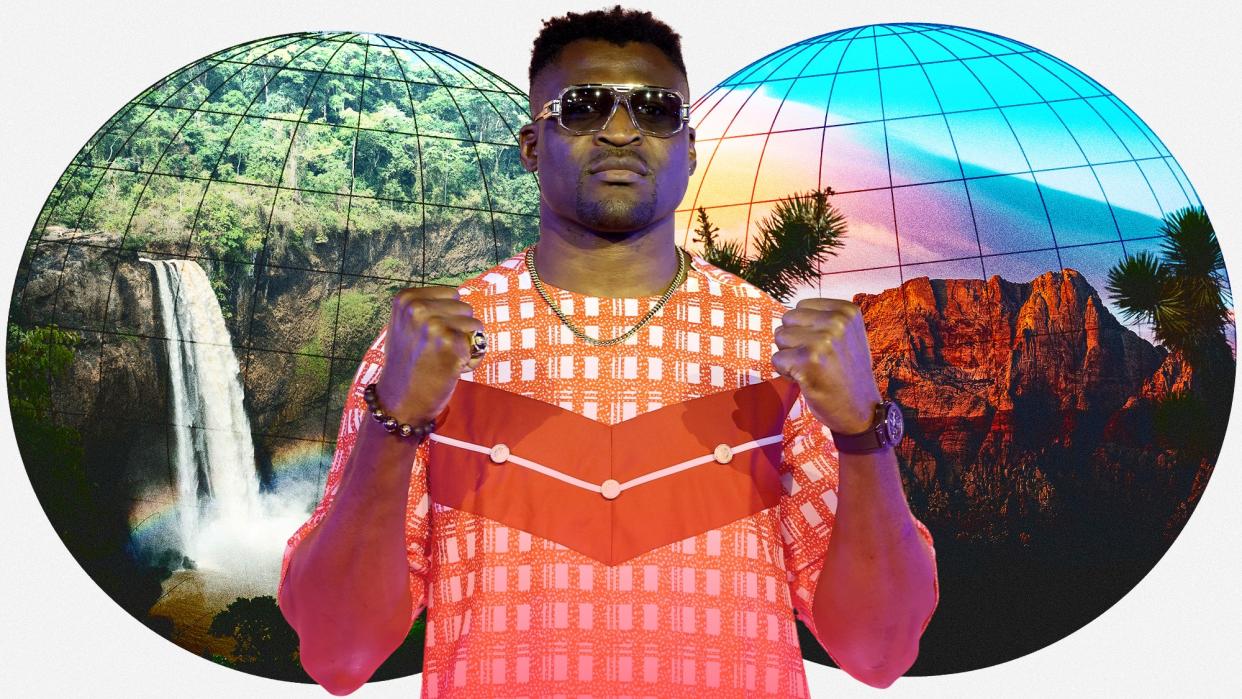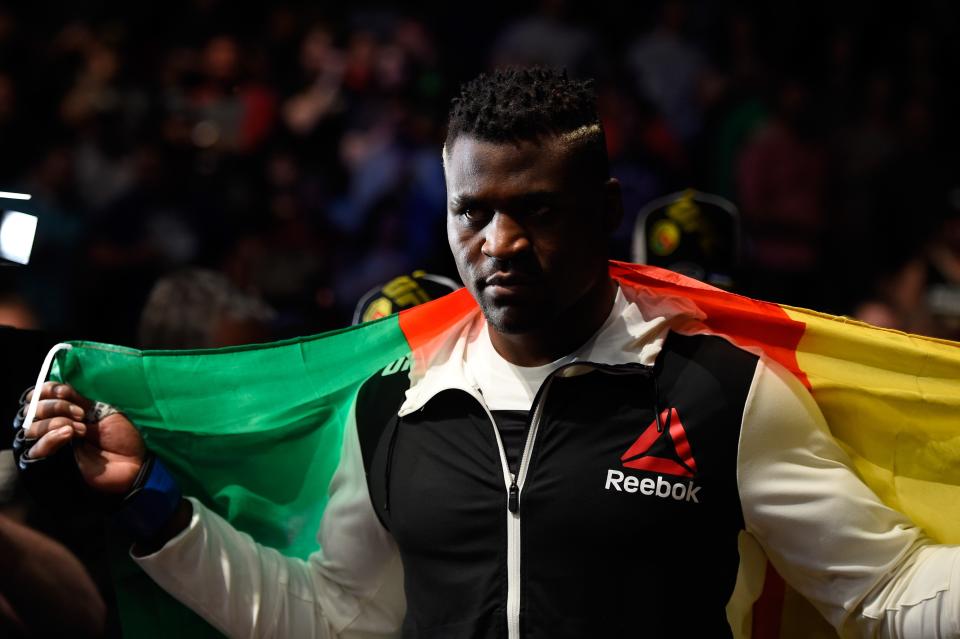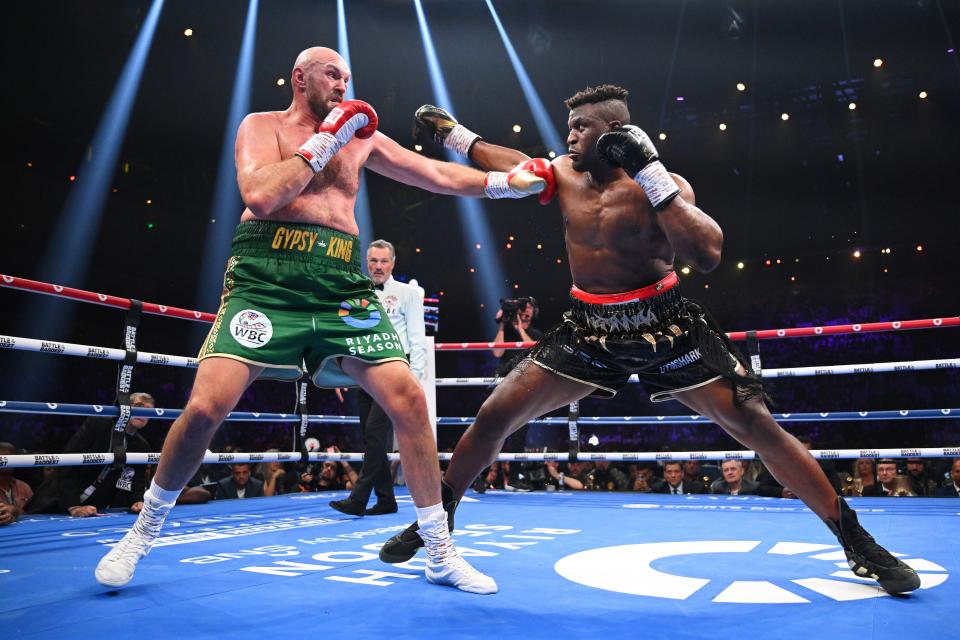On the Road With Francis Ngannou, Who Still Wants to Be an Architect

- Oops!Something went wrong.Please try again later.
Photographs: Getty Images; Collage: Gabe Conte
Few people on earth travel as often as professional athletes. With On the Road, the GQ Sports Travel Questionnaire, they’re weighing in on everything from room service to flying comfortably to their favorite chain restaurants.
In preparation for his highly anticipated boxing match against Anthony Joshua in Riyadh, Saudi Arabia on Friday, Francis Ngannou has been living and training in the country for over a month. But moving around, seeing new places, and being in constant transit is certainly nothing new for Ngannou, whose story of becoming one of the world’s best fighters is remarkable in itself.
The 37-year-old Cameroonian left his home country when he was 26 with dreams of becoming a professional boxer. But when he eventually reached Paris, he was homeless. Finding a mixed martial arts gym there provided a sense of community, but it also forced him to move boxing aside and focus on a different combat sport. Ngannou eventually made his UFC debut in 2015 and won his first heavyweight title bout in 2020 before a contract dispute led him back to boxing, where all eyes will be on him this weekend.
In between sparring sessions, Ngannou spoke to GQ about a life on the road that certainly has not been easy, but has given him the path to greatness he always envisioned.

UFC Fight Night: Arlovski v Ngannou
Josh Hedges/Getty ImagesGrowing up in Cameroon, it seems like you were around a lot of people who provided examples of what you didn’t want to be, rather than what you did want to be. What sort of things did you see that made you want to seek a better life?
I realized that if I had kids, I didn’t want them to have to go through the same path that I was going through. From that moment I started observing the things around me. I had a dream of what I wanted to become and what I wanted to do. I didn’t want to be like my dad. I mean, he was fighting, but not in the legal contests! I still liked fighting, but when I was a teenager there were gang members who wanted me to be part of their gang. They thought I was a good asset! I agreed with them, I had some potential that could be used. But I just didn’t agree with the way they wanted me to use my potential. I know how that type of story always ends up. It’s not a glorious one.
At that age, I was working at a sand quarry, then we would go farm. But that was just to grow food that we would eat at home. I had to pay a scholar fee, even for primary school, so that’s why we had to work so young. Nothing was structured back then. It wasn’t until maybe two or three years of doing that that we earned a salary and could say, Okay, we are working for this amount of money.
What led to your decision to drop out of school?
I never wanted to drop out of school. When I left school I was 17 years old. Even five years later, I wanted to go back, I just didn’t have the opportunity. I had to take care of my siblings and contribute at home. Doing that for nine years—I was a good worker, I was big for my age, I was basically the adult—it made me very aware of my situation. All of my free time, I was at the sand quarry.
It got complicated when I had to finish high school, because it was in a different city, and I didn’t know how to subsidize my living there. That was the reason why I dropped school. It wasn’t because I wanted to. I have a lot of desire to learn stuff. I remember when I left school, I wanted to get into architecture. That was something that I was quite passionate about. I just didn’t have an option.
Are you still interested in architecture? Have you taken any classes or anything?
Yeah, I tried! I was looking for architecture school for many years. I carried that dream even 10 years later. I was doing, like, a construction-engineering school, and I got very passionate about the architecture side instead of the construction side. When we go to school [in Cameroon], we do general—you do everything for the first few years to find what you really like—and after those years I wanted to be an architect. I was really good at designing homes. But I had to take what life gave me.
The story of you leaving Cameroon to get to Paris has been well-documented. What allowed you to keep going, even as you were living on the streets?
My background, my life. When I look back at it, there was no glory. I wasn’t really seeing anything to go back to, so quitting wasn’t an option for me. I decided that I’m doing this, and I’m doing it until the end. I think for some people, it seems more complicated than it was. For me, it was easy. When you don’t have too many options, sometimes that plays in your favor. It wasn’t like I had multiple choices. If I quit this, I can go do that. No.
Was your mind on fighting at that point?
Always! I’ve always loved fighting. That’s why, even growing up, I was watching movies and everything combat sport-related. But I never had a gym anywhere around. So when I was 22, I left the village [in Cameroon] to go into the city. That’s where I started boxing. This was back in 2008, and my goal was always to become world champion. When I left my country, it was just to pursue my career, and it was quite clear to me.
This dream has lived in me for years and years. In the village, I had gotten to the point where I wasn’t engaged with the sand mining anymore. I was like, Okay, I want to live my life and chase my dreams! I always knew what I wanted.

Boxing In Riyadh: Tyson Fury v Francis Ngannou
When you got to Paris, was that your first time there?
[laughing] I had never been to Europe! There wasn’t a way for people like us to get there. I wanted to go to the UK because I knew boxing was more developed in the UK. But then I decided I wanted to go to Germany, because at that time, heavyweight boxing went viral in Germany with the Klitschko brothers. [Note: The Klitschko brothers, while Ukrainian, were huge stars in Germany.] I wanted to go there! I didn’t care about the language barrier. Sport doesn’t need language.
But so many people in my group wanted to go to Paris. I was like, “Let’s stop in Paris first.” But the next day I found a gym, I met a guy, then another person, this and that. In one week, I had a whole network and a system for training. That made me so excited that I didn’t want to give it up. I knew my ultimate dream was to end up in America, so wherever I went was to end up there. I just needed to find that opportunity. Paris wasn’t bad, though!
Do you ever go visit Paris and think about how far you’ve come?
Yeah, I go to Paris a lot. I was in Paris earlier this year. It’s funny. I like to go to the parking lot I was sleeping at, or the park where I would brush my teeth and wash my face in the morning. I’ll get on the subway that I used to ride. I don’t jump the subway [turnstiles] anymore, though! I’m quite big and recognizable.
And now you live in Vegas?
Well, in the past six or seven years I’ve been in Vegas about two-thirds of the time.
Do you like living there?
Yeah, otherwise I wouldn’t still be there! When I chose Vegas, it was because I wanted to, it wasn’t because I had to. I really like it. I’ve found my spot, and I’ve made it a home.
What are some places you like to go for vacation?
I can’t really explain why, I think it’s because of the safari, but Tanzania is always on my mind. All the animals? I love that. Zanzibar has water that’s blue like the sky. That’s definitely the place for me.
I’m not a restaurant guy, I’m a room guy. I like to sit there and order. The best innovation for me was UberEats. Don’t have to go out, they drop it at my door, that’s it. Simple.
What about your favorite place to fight?
I think Riyadh. I’ve had the best experience here. Royal treatment? Come on, man.
Was getting there the longest flight you’ve ever been on?
The longest I’ve been in the air was LA to Dubai. I think that was 15 hours. But it was a good flight! That was my first time in the first-class cabin where you can close yourself off from everything and you have a little fridge. Everything is cool, right? I didn’t mind those 15 hours! It wasn’t terrible.
The second time, it makes you kind of tired, but the first time you’re just enjoying everything. Otherwise—like if I’m going from Vegas to Cameroon, that’s always at least two layovers—that ends up being 20-22 hours of traveling. I was never afraid of flying, I’m just tired of it. Man, I would pay way more to teleport.
Maybe that will be possible at some point within our lifetimes.
You can’t say no! A lot of shit is happening right now.
Originally Appeared on GQ

